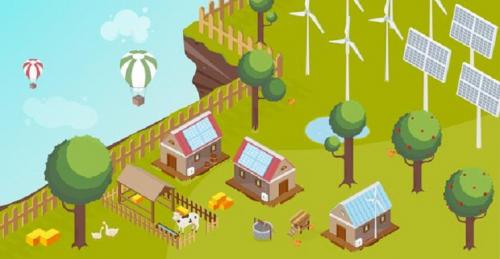3 Main Types of Solar System for Home

Solar energy is known as the cleanest source of electricity. It can be used by homes, offices and all types of industrial enterprises including airports. Using solar energy to generate your own electricity doesn’t just reduce pollution and reduce our dependence on fossil fuels, it also minimizes your expenses by taking away your electricity bills. If you’re thinking of installing a solar system for home use, there are three types of systems you can choose between. Read on to know more.

Off-Grid Solar Power
System
When you imagine a solar power system, if you picture being independent from the main power grid, you’re picturing an off-grid solar power system. This is a system wherein the solar panels are connected to an inverter and further to a battery. The battery is where excess power is stored and from where the inverter sources power at night. An off-grid solar system for home gives you independence and means you don’t have to pay monthly electricity bills but if you live in a place where you don’t get much sunshine during the monsoons and winters, you may face a problem.
Grid-Connected Solar
Power System
A grid-connected system is one where you have solar panels that generate electricity for your home but you still maintain a connection with the main grid. No matter how well you calculate the number of panels needed for your system, it will generate excess electricity. This excess power is shared with the main grid in exchange for credits. During the night and months when your panels cannot generate sufficient electricity, you can take power from the main grid in exchange for the credits. Thus, you get reliable power throughout the year. The only downside is that if the main power grid has a blackout at night, you too will be without power.
Hybrid Solar Power
System
A hybrid solar power system offers the benefits of both an off-grid solar power system and a grid-connected solar power system. In this case, your solar system will maintain a connection with the main power grid but will also be connected to a battery. A certain amount of power is stored within the battery and the rest is shared with the main grid. If the main grid has a blackout when your solar panels aren’t generating electricity, the battery will act as a source of power for the inverter. The only downside is that this type of solar system requires a little more investment since you require a battery and a meter to calculate the flow of electricity between the solar panels and the main grid.
There is no one size fits all solution to choosing the ideal solar system for home. If you get high electricity bills every month and live in a place that is sunny throughout the year, an off-grid solar power system would work. But, if you live in a place without sunshine for a few months of the year, a grid-connected system would be a better choice. So, take all the factors into consideration and choose a system that works for you.
Post Your Ad Here



Comments